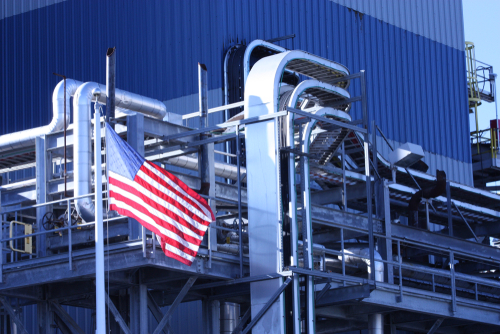A newly introduced bill in Congress would support and promote U.S. manufacturing and energy production over foreign competitors by showcasing the lower greenhouse gas (GHG) emissions of American-made products.

“We should embrace the fact that American industries produce cleaner and with better standards than anywhere else in the world,” said U.S. Rep. John Curtis (R-UT), who sponsored the bill on July 9. “This bill is not just about proving our energy dominance; it’s about leveling the playing field in international competition.”
The Providing Reliable, Objective, Verifiable Emissions Intensity and Transparency Act of 2024, H.R. 8957, also known as the PROVE IT Act, would require the U.S. Department of Energy (DOE), in coordination with other federal agencies, to publish a study identifying the GHG emissions intensity of specific products produced in the United States that compares them with those produced internationally.
The specific products covered under the proposed bill would include aluminum, articles of aluminum, articles of cement, articles of iron and steel, articles of plastic, biofuels, cement, crude oil, fertilizer, glass, hydrogen, iron and steel, lithium-ion batteries, natural gas, petrochemicals, plastics, pulp and paper, refined strategic and critical minerals, refined petroleum products, solar cells and panels, uranium, and wind turbines.
The DOE study would provide detailed, specific, and transparent data on emissions, helping to hold countries with less stringent environmental standards accountable, according to Curtis.
“Russia and China are on an unapologetic trajectory to energy dominance, using none of the innovative technologies or regulations that make our energy cleaner in the United States,” he said. “This legislation will help American businesses compete globally, strengthen our trade relationships, and provide our allies with a reliable energy partner.”
After the study is published, the DOE would be required to update the data every five years. The bill also would require that the human rights and labor standards of each country producing a qualified product be taken into account.
“To address climate change, we must have a global race to the top so that all nations have more strong incentives to reduce their emissions,” said U.S. Rep. Scott Peters (D-CA), the bill’s top cosponsor. “Our PROVE IT Act will provide the data to show the benefits of America’s high environmental standards while holding nations like China accountable for their emissions-intensive practices.”
A U.S. Senate version of the bill, S. 1863, was introduced in June 2023 by U.S. Sens. Chris Coons (D-DE) and Kevin Cramer (R-ND).
“If the goal is to reduce global emissions, the answer is to produce more in America,” Coons said earlier this year when his bill passed the U.S. Senate Environment and Public Works Committee. “Our bipartisan PROVE IT Act acknowledges American excellence while protecting workers and businesses from unfair tariffs and foreign competitors seeking to undercut them.”
Several groups support the measure, including the Steel Manufacturers Association, the American Iron & Steel Institute, the U.S. Chamber of Commerce, the Concrete Reinforcing Steel Institute, the Bipartisan Policy Center (BPC) Action, and the Climate Leadership Council, among others.
BPC Action, for instance, tweeted yesterday on X, formerly Twitter, that the bill would require the collection of solid data, which would enable America to better compete globally as one of the cleanest economies in the world.
“This common-sense bill will provide reliable and transparent data on product-level emissions, placing the United States in a better position to bolster our trade relationships with allies, expand domestic manufacturing, and hold China accountable for their emissions,” BPC Action President Michele Stockwell added yesterday in a statement.